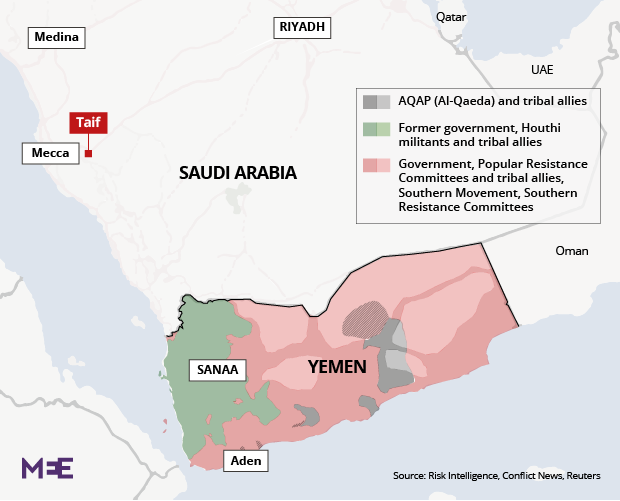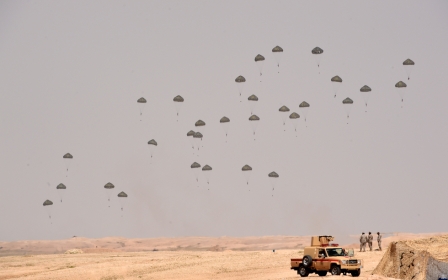Houthis fire missiles at Saudi base and US navy ship after funeral attack

Yemeni rebels fired a long-range missile at a military base deep inside Saudi Arabia on Sunday evening, a day after the Saudi-led coalition bombed a funeral in Sanaa killing over 140 people.
Houthi rebels gave no reason why they fired the ballistic missile toward the King Fahd military base in the Saudi city of Taif, which is near Mecca.
However, the attack came less than 24 hours after the Saudi-led coalition was blamed for bombing a funeral in the Yemeni capital denounced by the United Nations as a “horrendous and heinous” attack.
Saudi state television broadcast a brief clip of what appeared to be the missile landing in Taif, with emergency vehicles attending the scene after an explosion was seen on camera.
Saudi authorities said the missile caused no damage, but it was the deepest strike inside the kingdom so far carried out by Houthi rebels, with the Soviet-era Scud rocket landing some 520km beyond the Yemeni border.
The reported target of the missile strike – the King Fahd military base – is home to American soldiers who are based there to advise their Saudi counterparts on the coalition’s war in Yemen.
On Sunday night two missiles were also fired at a United States navy vessel in the Bab el-Mandeb Strait, according to a spokesperson for the American navy.
The US navy said in a statement that no American sailors were injured and no damage caused to the USS Mason, which is a guided missile destroyer usually homed in Norfolk, Virginia.
Previous attacks by the Houthis have hit Saudi cities much closer to the border, including on Friday when a missile hit the south-west city of Khamis Mushait.
As well as firing on Saudi cities, the Houthis have begun targeting ships operating in the sea off the coast of Yemen, in the strategic waterway known as the Bab el-Mandeb Strait, which acts as a strategic connection between the Indian Ocean and the Mediterranean Sea, via the Red Sea and Suez Canal.
The USS Mason "detected two inbound missiles" within an hour of each other from about 7pm on Sunday, said US navy spokeswoman Paula Dunn.
The destroyer had been "conducting routine operations in international waters" at the time, she said in a statement.
"Both missiles impacted the water before reaching the ship," said Dunn, adding that "there were no injuries to our sailors and no damage to the ship".
"We assess these missiles were launched from Houthi-controlled territory in Yemen," she said.
However, a spokesperson for the Houthis told Reuters on condition of anonymity that they were not responsible for the attack on the navy vessel.
"(The Houth movement) denies targeting any ship off Yemeni waters," an official said.
The incidents come after the United Arab Emirates said last Wednesday that the Houthis struck a "civilian" vessel in Bab al-Mandab, wounding crewmen.
That attack, which was carried out on 1 October, was claimed by the Houthis.
The UAE is a key member of a Saudi-led coalition that has been fighting the Houthis since March 2015. The coalition was formed to push back Houthi rebels who seized control of much of Yemen, forcing the Riyadh-backed government of President Abd Rabbuh Mansour Hadi into exile.
Arab Gulf States believe the Houthis are backed by regional rival Iran, which on Sunday offered to treat the wounded from the funeral strike in Sanaa.
The Yemen war has proved devastating for a country that was already the Arab world’s poorest nation. The UN has reported that over 80 percent of the country’s 25 million people require some form of humanitarian assistance.
The UN has also warned that 1.5 million children are among millions of Yemeni who are food insecure, with 370,000 suffering severe malnutrition. The New York-based body has said that Yemen may be about to go into famine, as the Saudi-led coalition maintain a naval blockade on the country.
The UN and rights groups estimate that at least 9,000 people have been killed in the war, and more than three million others displaced.
Peace talks held in Kuwait have stalled and failed to produce a pathway to ending the war.
This article is available in French on Middle East Eye French edition.
Stay informed with MEE's newsletters
Sign up to get the latest alerts, insights and analysis, starting with Turkey Unpacked
Middle East Eye delivers independent and unrivalled coverage and analysis of the Middle East, North Africa and beyond. To learn more about republishing this content and the associated fees, please fill out this form. More about MEE can be found here.





